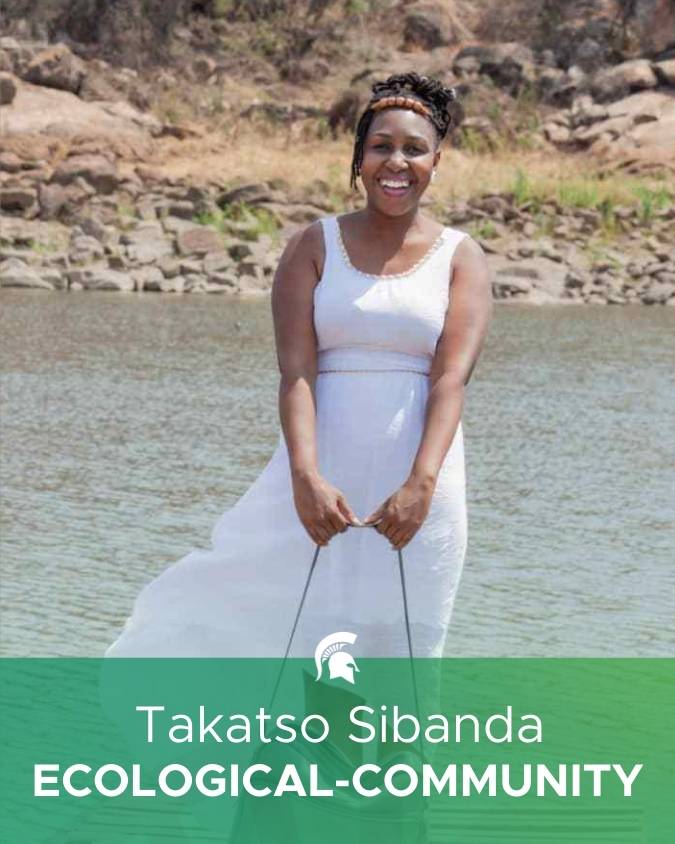Introducing New Graduate Student Takatso Sibanda
August 14, 2024 - Shelly DeJong
 Meet Takatso Sibanda, an incoming graduate student in the ecological-community research area.
Meet Takatso Sibanda, an incoming graduate student in the ecological-community research area.
Name: Takatso Sibanda (she/her)
Hometown: Bulawayo, Zimbabwe
Education:
Bachelor of Psychology, 2009, University of Namibia
MSc Development Studies, 2021, National University of Science and Technology in Bulawayo, Zimbabwe
Advanced MSc Cultural Anthropology and Development Studies, 2023, KU Leuven, Belgium
Tell us about your background/experience.
Over the last fourteen years I’ve worked in various capacities servicing vulnerable groups within the health and social services fields in Zimbabwe. My roles ranged from supporting teenage girls with life skills at Dominican Convent High School to providing psychosocial support to survivors of child sexual abuse at CONTACT Family Counselling Centre and teenage preterm mothers at the Baby Heroes Africa Foundation. Through these roles, I’ve been able to engage closely with different social constituencies, including socially marginalized groups, civil society, government ministries, health care professionals, schools and churches. This work laid the basis for my graduate studies.
Since 2019, collaborative qualitative research exploring access to comprehensive and affirming health services in Zimbabwe has been the nexus of my work as a Research Assistant at the Ali Douglas Development Consultancy (ADDC). I’ve gained vast experience in needs assessment and impact evaluation of civil society programs facilitating access to health services. This deeply insightful work illuminates the significance of inclusive service delivery, evaluation and learning paradigms that embrace richer ways of interpreting the impact of various interventions in bridging health disparities among marginalized populations.
Why graduate school?
I enjoy the research process immensely. The complexity of learning and thinking about a subject, figuring out the best questions to ask to deepen understanding, engaging people to explore their lived experience, and interpreting the findings from various lenses adds layers of nuance to my worldview. The MSU Ecological/Community Psychology PhD program appeals to me because it bridges the research-practice gap through linking classroom learning with project-based work and research. Above all, the independent research, critical reflection, analytical and interpersonal skills plus experience I acquire through working closely with fellow students and mentors in the MSU Psychology department will add value to my life and work. I also expect my PhD to inform my ongoing work with the Lub’elihle Foundation, a non-profit youth empowerment organization I founded in 2010. The initiative grew from my efforts to support teenage girls in my Gwabalanda neighborhood with career guidance and has since expanded into a comprehensive personal development and wellness program that currently supports young women with menstrual health. My work with the Lub’elihle Foundation holds great meaning for me because it allows me to be the change that I desire to see. This intersection of identity, sociocultural context and wellness gestures to the knowledge angles that I’d like to pursue through my PhD.
What do you hope to research while you're here?
I’m particularly drawn to Professor Robin Miller’s background in program evaluation and implementation science as well as her current work with civil society organizations in Africa focusing on effective community-based HIV prevention and care services. I’m excited to be joining her MSU HIV and Sexual Health Research Team. I intend to use ethnographic investigation to explore the lived experiences of people at the intersection of disability, diverse sexual orientation, gender identity and/or expression and other marginalized identities within health settings in Zimbabwe. I hope to generate knowledge that contributes towards improving underserved populations’ access to comprehensive, affirming and sustainable health services. I’m also excited about exploring the use of visual methodologies such as film which incorporate narrative inquiry and storytelling in my research.
What do you love about Ecological/Community psych?
I’m drawn to the ecological approach’s emphasis on prevention of health/social problems, wellness promotion, empowerment and social justice. I think of community psychology as the psychology of development because it allows the nuanced exploration of the human psyche in relation to the realities of daily life. Its interdisciplinary elasticity straddles various domains of inquiry that tap into the hues of diversity and cadences of community identities, histories, struggles and aspirations.
In your free time what do you like to do:
I’m a voracious reader and enjoy a good novel. I also love to cook, write fiction, take long walks, visit art galleries, watch films and spend quality time with family and friends.

